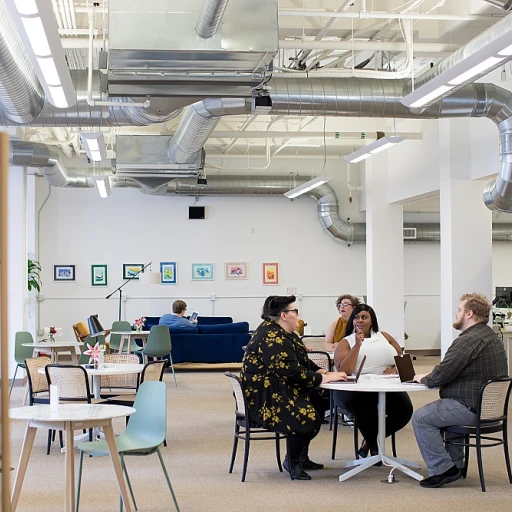
Defining Career Alignment
Establishing a Clear Connection Between Career and Personal Values
Understanding career alignment means identifying the core values and long-term goals that make a job feel not just like work but a fulfilling path in life. Career alignment is all about ensuring your personal values and professional goals are on the same wavelength. This alignment can often be the difference between merely having a job and truly flourishing in your career.
Career alignment opens a window to more job satisfaction, allowing individuals to feel more connected to what they do every day. When you align your career with your life goals and values, your work-life balance tends to improve, creating a more harmonious existence overall.
Consider what matters most in terms of your core values and career goals. Do you value opportunities for growth, or perhaps a balanced life, something many people often overlook? Identifying these elements is crucial for a successful career alignment.
In today's dynamic job market, career paths are not what they used to be. Many individuals find themselves on non-linear paths, often driven by the changing landscape of work. This flexibility allows for career change and transitions that honor personal satisfaction and professional development. Exploring key occupations for upskilling can guide you in finding new career avenues that align with your values and skills.
Career alignment does not occur overnight; it requires time and dedication to evaluate and reassess goals consistently. By identifying and focusing on personal and professional development, individuals can better navigate their career paths and align them with their true aspirations and core values.
The Role of Upskilling in Career Alignment
The Crucial Role of Upskilling in Achieving Career Success
Upskilling is a pivotal concept in the journey towards career alignment and success. In the rapidly evolving modern workforce, the need to adapt and grow one’s skillset is universally recognized. Understanding the role of upskilling can help individuals align their careers with their core values and personal goals, which ultimately leads to a more fulfilling and successful professional life. Increasingly, individuals are realizing that upskilling not only enhances their abilities but also unlocks new career paths and opportunities for career change. Upskilling allows professionals to stay relevant in their job and prepare for hiring trends and demands in various industries. In the context of career alignment, upskilling serves several critical functions:- Bridging Skill Gaps: Individuals often encounter gaps between their current skills and those required for desired career progress or transition. Upskilling helps in filling these gaps, enabling smoother career transitions and aligning career paths with personal aspirations.
- Facilitating Career Development: Continuous learning and development are cornerstones of professional growth. By regularly upskilling, individuals can pursue career development opportunities that align with their long-term career goals and personal values.
- Enhancing Job Satisfaction: Engaging in upskilling can lead to increased job satisfaction by creating a sense of progress and achievement. As individuals see their skills being applied successfully in their work, they feel more aligned and satisfied with their career choices.
- Aligning with Core Values: Upskilling provides a chance to step back and reflect on what matters most in a career. This personal development phase encourages alignment between core values, career goals, and the work being performed.
- Adapting to Change: The workforce is continuously evolving, and career paths are not as linear as they once were. Upskilling embraces change, allowing professionals to adapt to new technologies, market demands, and evolving work environments.
Identifying Your Core Skills and Interests
Identifying the Skills and Interests That Drive Your Career
Taking the first step towards a successful career alignment involves understanding what truly motivates you. It means delving into your core values, personal interests, and the skills that define your professional path. This process not only opens doors to increased job satisfaction but aligns your career with your long-term life goals.
Here are actionable steps to identify these crucial elements:
- Reflect on Personal Values: Understand what career aspects matter most. Consider aspects like work-life balance, the type of contribution you wish to make, and the environments where you feel most productive.
- Evaluate Core Skills: Determine the abilities you excel in and those that give you a sense of achievement. This will inform your career path and the types of career development you should pursue.
- Explore Job Satisfaction Elements: Identify tasks that you enjoy and feel passionate about, even if they require upskilling. This may involve adapting to new trends to keep your skills relevant in a changing job landscape.
- Set Clear Career Goals: Establish both short-term and long-term objectives in your professional journey. This can guide your personalized upskilling plan, ensuring that it serves your overarching life aspirations.
Recognizing these components will provide a clearer picture of your ideal career paths and how to best align them with your professional and personal aspirations. It can be a transformative experience, leading you towards a fulfilling and sustainable career.
Moreover, understanding your strengths and preferences aids in identifying the areas for further career development and helps you navigate potential career changes or transitions smoothly. Being conscious of these aspects is essential in cultivating a meaningful work life.
For further insights on why companies value these skills, you can explore more on retaining employees.
Creating a Personalized Upskilling Plan
Designing Your Upskilling Strategy
Embarking on a journey to align your career with your core values and career goals requires a thoughtful approach. Developing a personalized upskilling plan is crucial for ensuring that your path of professional growth leads to job satisfaction and life balance. Here's a guide to creating a strategy that resonates with your personal and professional objectives. First, it's important to reflect on your career path and identify what matters most to you. Understanding your core values enables you to pursue what truly aligns with your career aspirations and personal life. This clarity will guide you in selecting skills that not only enhance your current job but also open doors to other potential careers. Consider asking yourself these questions:- What are your long-term career goals? Clearly define where you want to be in the future. Are you aiming for a management role or considering a career change?
- Which skills require development? Analyze where the gap lies between your current abilities and the skills needed for your desired job or career transition.
- What values do you want your work life to reflect? Assess how a potential career aligns not just with your professional goals, but also with your personal values and lifestyle preferences.













